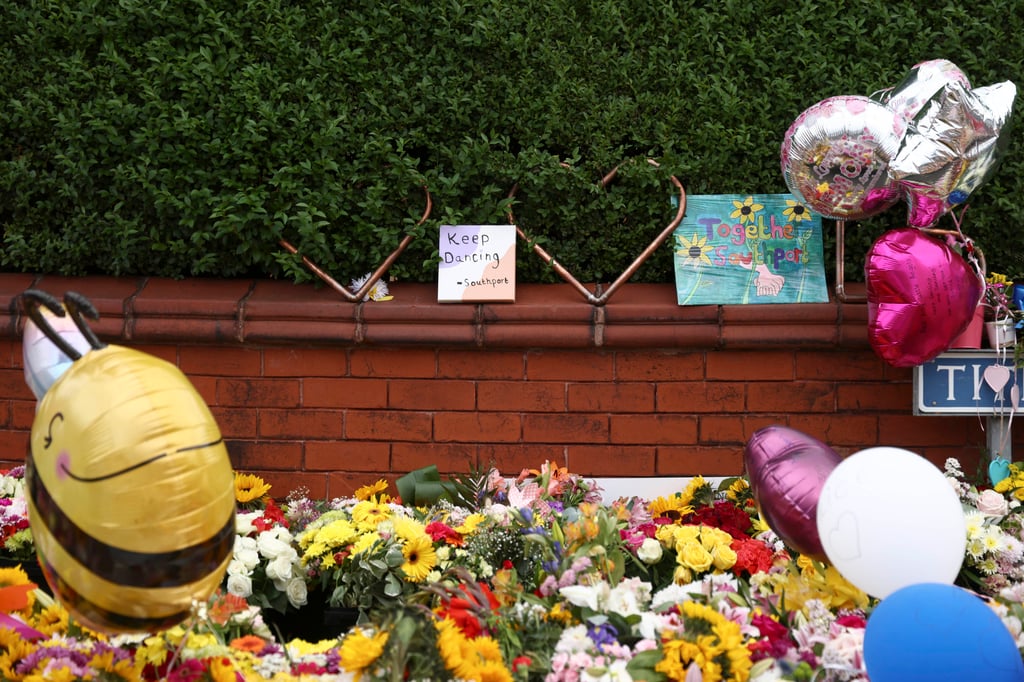As part of a “number of actions” to come out of Monday’s meeting, the government will “ramp up criminal justice” to ensure that “sanctions are swift”, Starmer told the media.
He also said a “standing army” of specially-trained police officers was ready to be deployed to support local forces if any further riots break out.
“My focus is on making sure that we stop this disorder,” he added.
Clashes erupted in Southport a day after three young girls were killed, and five more children critically injured during a knife attack at a Taylor Swift-themed dance class.
False rumours initially spread on social media saying the attacker was a Muslim asylum seeker, but police said the suspect was a 17-year-old born in Wales, with UK media reporting he has Rwandan parents.
However, that has not stopped mosques from being targeted.
Police have since arrested hundreds of people in towns and cities nationwide, with anti-immigration demonstrators and rioters facing off against police and counter-protestors, including groups of Muslims.
The prime minister on Sunday warned rioters they would “regret” participating in England’s worst disorder in 13 years, while his interior minister Yvette Cooper told the BBC on Monday that “there will be a reckoning”.
Cooper also said that social media put a “rocket booster” under the violence, and Starmer stressed that “criminal law applies online as well as offline”.
Police have blamed the violence on people associated with the English Defence League, an anti-Islam organisation founded 15 years ago whose supporters have been linked to football hooliganism.
Some of the worst scenes on Sunday broke out in Rotherham, northern England, where masked rioters smashed several windows at a hotel that has been used to house asylum seekers.
At least 12 officers were injured, including one who was knocked unconscious, as they battled around 500 protesters with “far-right and anti-immigration views”, South Yorkshire Police’s Lindsey Butterfield told media on Monday.
There were also large scuffles in Bolton, northwest England, and Middlesbrough, northeast England, where mobs smashed windows of houses and cars, leading to 43 arrests.
Protesters there seized a camera from media and broke it. The journalists were not injured.
Late on Sunday, Staffordshire police said another hotel known to have sheltered asylum seekers was targeted near Birmingham.
The violence is a major challenge for Starmer, elected only a month ago after leading Labour to a landslide win over the Conservatives.
MPs from all sides have urged Starmer to recall parliament from its summer holiday, including Conservative former interior minister Priti Patel, Labour MPs Diane Abbott and Dawn Butler, and Reform UK leader Nigel Farage.

Police have said more than 150 people were arrested over the weekend.
Rioters threw bricks, bottles and flares at police — injuring several officers — and looted and burnt shops, while demonstrators shouted anti-Islamic slurs as they clashed with counter-protesters.
The violence is the worst England has seen since 2011, when widespread rioting followed the police killing of a mixed-race man in north London.
Authorities have said the initial violence was partly caused by the false rumours about suspect Axel Rudakubana, who is accused of killing a six, seven, and nine-year-old, and injuring another 10 people.
Agitators have targeted at least two mosques, with the government now offering new emergency security to Islamic places of worship.
The rallies have been advertised on far-right social media channels under the banner “Enough is enough”.
Participants have waved English and British flags while chanting slogans like “Stop the boats” — a reference to irregular migrants crossing the Channel to Britain from France.
Anti-fascist demonstrators have meanwhile held counter-rallies in many cities.
At last month’s election, the Reform UK party led by Brexit cheerleader Farage captured 14 percent of the vote — one of the largest vote shares for a hard-right British party.


